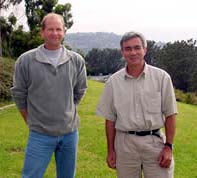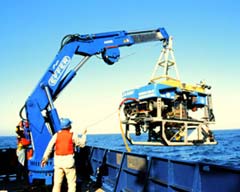
Study, which shows microscopic plants keep planet warm, offers new considerations for iron fertilization efforts in the oceans
The ecological importance of phytoplankton, microscopic plants that free-float through the world’s oceans, is well known. Among their key roles, the one-celled organisms are the major source of sustenance for animal life in the seas.
Now, in a new study conducted by researchers at Scripps Institution of Oceanography at the University of California,
A new lightning index that uses measurements of water vapor in the atmosphere from Global Positioning Systems has improved lead-time for predicting the first lightning strikes from thunderstorms. The index will help greatly aid NASA Space Shuttle launches at Kennedy Space Center, Fla, and other commercial and U.S. Department of Defense launches from Cape Canaveral Air Force Station, Fla.
“Better forecasting and more advance warning of lightning strikes will help reduce the delays or cancell

JASON II reaches most of the world ocean floor and sends data ashore via the Internet
A new generation of remotely operated vehicle (ROV) capable of routine operation to depths of 6,500 meters (21,320 feet) and communicating its data back to shore via the Internet has been developed by the Woods Hole Oceanographic Institution (WHOI). The vehicle, JASON II, recently completed its first science cruise off the coast of Washington and Oregon and is currently at sea in the Pacific wo
Warmer or colder sea surface temperatures (SST) may affect one of the world’s key large-scale atmospheric circulations that regulate the intensity and breaking of rainfall associated with the South Asian and Australian monsoons, according to new research from NASA.
A monsoon is a wind that changes direction with the seasons. Monsoons develop from changing patterns of atmospheric circulation which are caused by changes in heating and cooling of land and oceans. One of the strongest and most
NASA scientists using satellite data have shown that shifts in rainfall patterns from one of the strongest El Niño events of the century in 1997 to a La Niña event in 2000 significantly changed vegetation patterns over Africa.
Assaf Anyamba and Compton Tucker of NASA’s Goddard Space Flight Center, Greenbelt Md., and Robert Mahoney of Global Science and Technology Inc (GST) analyzed satellite derived images of vegetation from 1997 to 2000. They noticed regions of above normal “greenness” ov
Populations of marine fish may lose genetic diversity even if fishing stops while there are still several million individuals – a number previously assumed to be enough to preserve a diverse gene pool.
Losing the diversity of key genes can render a population less productive and unable to adapt when faced with challenges such as global warming, pollution or changes in predators or prey. Rare genetic variation of little importance today might be the key to adaptability in the future, accordin